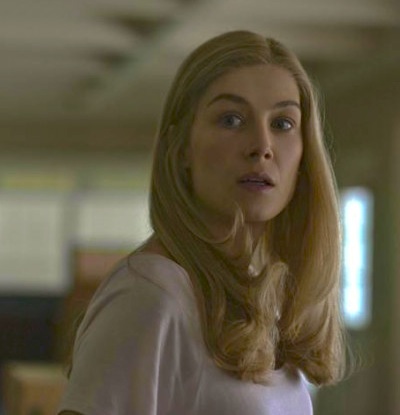 Director David Fincher has done some competent, stylish B movies in the past, e.g. Zodiac, The Social Network, and I guess you could call his latest, Gone Girl, a competent, stylish B movie.
Director David Fincher has done some competent, stylish B movies in the past, e.g. Zodiac, The Social Network, and I guess you could call his latest, Gone Girl, a competent, stylish B movie.
I went to see the film because as a writer I was curious about the plotting of the original story. And I came away impressed with the intricate, he says/she/says twists and turns of this lurid domestic saga. I also came away with the sobering lesson that it doesn’t matter how smart your story is, if you don’t deliver an ending that satisfies all of your plotline teasing, your reader (or in this case, viewer) will come away feeling unsatisfied and ripped off.
First off, could anyone tell me why Ben Affleck is allowed in front of a camera? Listless and wooden, he is impossible to like. Yes, I know. His character was supposed to be questionable. Is he telling us the truth when he says he doesn’t know where his wife is? Did he kill her? Is he hiding some huge horrible secret? Maybe Affleck is fine for that character — typecast even. But he is almost unwatchable.
I was curious to see what the fuss was about—the book by Gillian Flynn is such a huge hit.
Okay we meet the couple and their first five years together, mostly in flashbacks told by the wife’s diary. Amy and Nick Dunne have been a dream couple, until the recession hits and they move from Manhattan back to Nick’s hometown in Missouri. On the eve of their anniversary, Amy disappears. Nick calls the police, they ask questions, he has very few answers, and things heat up. Meanwhile, we find out “details” thanks to Amy’s diary, which riffs about their courtship, intense sexual chemistry, and then, well, things start not being so wonderful.
Meanwhile allegedly disraught hubby Nick (played as if in a coma by Affleck) confides in his twin sister Margo (played by the non-comatose Carrie Coon), that he was just about to ask for a divorce from the gorgeous Amy (played with cool edge by Rosamund Pike). We soon find out why. As Affleck’s character reveals more and more that supports his innocence in l’affair Amy, a media circus is whipped up by neighbors and Amy’s parents. The entire country starts holding “Find Amy” vigils. And Nick looks like an abusive sadist.
So he gets a lawyer—Tyler Perry in a very smart, and unexpected little film-stealing turn.
The film then pivots—as the book probably did—to reveal more about Amy. We find out where she really is, and what she’s really doing. It gets quite delicious. I don’t want to give away any spoiler details, let’s just say the tension is ramped up and up.
Uh oh. The film’s ending releases all of that tension in the most unbelievable, as in “not even credible” way. The film’s “resolution” is ludicrous, utterly unsatisfying, especially since we’ve come to loathe the Amy character by the last half hour of the film.
I simply cannot believe that the book offered the same, “I don’t believe it for a minute” ending. And if it did, then it had to have been handled in much savvier, more dynamic fashion. Fincher simply lays down the final strokes of this waaaaay too long (2hrs 25 mins) movie as if he were late for a golf date. Slam, bam. There it am. And here some blame must be laid at the long-limbed doorstep of Pike, who simply doesn’t ring true as a cunningly complex sociopath. More Stepford Wife than Lucretia Borgia.
Should I read the book and find out why it spent so much time on the NYTimes bestseller list?


Don’t usually concur with your reviews but this one is spot on. With the exception of the “The Town” Affleck should be kept away from on camera but his directorial skills are quite respectable. That being said I liked the film.